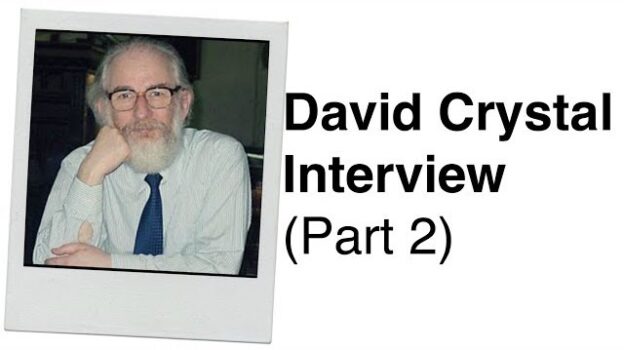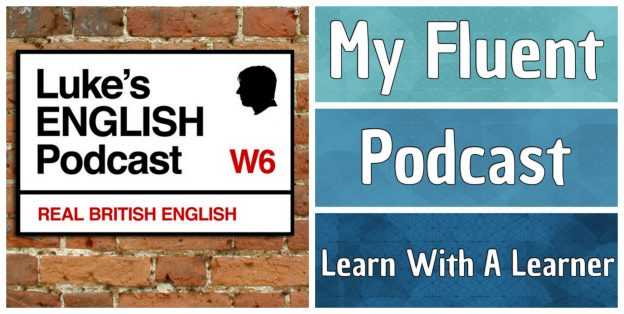A follow-up to episode 455 consolidating the insights of Professor David Crystal including various pearls of wisdom about language learning.
[DOWNLOAD]
Notes & Transcriptions
Hamid
If English keeps taking on words from other languages, will it stop being English?
This is the story of English.
English is a vacuum cleaner of a language.
Something like 300-600 languages have influenced English with words. If you look at English today. Where are the germanic words? They’re only about 20%. The other 80% is from French, Spanish, latin and others.
There is no single dominating influence on English today.
How many Urdu words have gone into English? Maybe 100. But English has over 1,000,000 words. No new cluster of words coming in is going to come in all at once (tidal wave) they come in drip drip drip.
New words are assimilated to reflect a need – e.g. for new types of food.
This is no threat to English.
In fact it’s evidence of the power of English, that it absorbs so many other influences from other languages and cultures. It’s like the blob!
Jilmani
What’s the future of English?
Unpredictable! Absolutely an unanswerable question. You should never try to predict the future of a language. It’s all about events which just happen, e.g. the Norman invasion, Trump or Brexit.
Will Brexit reduce the influence of English in EU?
Not much. But it will change its character because it won’t be used by so many native speakers, so there will be more developments “Euro English” (I think it has emerged a bit).
But English will continue to change and diversify.
Jairo – wants help managing the workload of studies.
Learning about language is a huge burden.
Learning about a language you have to learn about the history, society and events of the time to understand why people were using language in those particular ways.
What was it like to be an old norse speaker?
But most philologists don’t have a psycholinguistic background to their studies.
Philology can be a bit dry.
David prefers the socially aware approach to the history of language which doesn’t just ask “what happened and when” but “why?” – let’s explore the nature of the people who made it happen. This should ease the process.
Cat
English syntax – can you explain it?
Come on you’re asking for a book here!
English has a simple morphology compared with German (or French).
How many possible word endings are there for a verb in English?
The difference between English and German is morphological but also syntactic.
English and German are quite close. They only diverged 2000 years ago.
Word order is a bit different.
Everyone understood David when he went to Germany and spoke German with the wrong word order.
There aren’t that many differences, although the few differences are noticeable.
Cat, why are you worried about local areas of syntactic difference between English and German. Why has this become an issue?
It usually comes down to identity. German English (used by people who have learned it really well) still is distinctively German English.
The point is, don’t be too concerned about micro differences in syntax between your language and English. As long as we understand you that’s the main thing, although obviously style is important so I imagine you want to write in the style of a native speaker (but which one though!) You might have to accept that it’s important to find your own voice in English, which might be influenced a bit by who you are (it is your own voice after all) – which is someone who lives in Germany. That’s not to say your English can be totally different and like German with English words – that would probably be unintelligible and a bit ridiculous. But micro differences aren’t such a big deal.
Don’t sweat the small stuff, it’s just small stuff.
Wesley
Do people who speak different languages think differently?
It’s difficult to translate words sometimes because there are some words which don’t directly translate because there isn’t an equivalent word. 10-15% of the words might be untranslateable. But in Chinese it’s a lot more.
But when you do psycholinguistic experiments we discover that people can see the different concepts, but having those specific words makes it easier to talk about those things. You can see the colours but you might not have the language for describing it.
Different languages might not have the same word for something but it doesn’t mean they think about them any differently.
E.g. in English we don’t have a word for a certain thing in Japanese – natsukashii for example. But we find other ways of describing it. Ah, it takes me back or “good old” or “it feels nostalgic” or “it’s good to be back”.
So it doesn’t seem to be the case that languages affect or reflect different perception of the world.
*But I reckon there might be something to it Wesley. E.g. sense of humour, patterns of understatement, all contribute towards expressing a sardonic outlook on life (UK) rather than a direct attitude in the mediterranean for example.
The fallacy is that it’s words that translate, but it’s not it’s sentences. A group of words together are what hold meaning. So even if there’s no single word equivalent, you put some words together and make a sentence and that’s how the language transcribes.
“Snow that you use to build an igloo with” – he can still express that thing with a sentence and you can see that kind of snow.
Learn the vocabulary of a new language and you’ll see the cultural things that it reflects. It shows that to learn the language properly you should learn about the culture too – the mindset, the reference points and so on. You can see all those things too, but having certain words and expressions makes it easier to talk about them.
The result is that in languages it’s easier to talk about commonly occurring cultural phenomena because the language has the tools to do it, but people are all still basically the same, we might just take a bit longer to talk about a concept that in your language is very normal.
Mayumi
Why do Brits use indirect language?
It’s just a cultural difference. It’s the British temperament. The reason for that is hard to say. Maybe it’s because the UK is an island and the psychogeographic factors might affect that kind of language use.
Pragmatics – the study of why people are using specific bits of language.
Language norms reflect the cultural context – that’s the identity argument.
But why does the UK use this polite language? We don’t really know! You have to ask why British people want to be polite. (obviously it’s because we’re such nice people)
You just have to accept the cultural differences. Learn about them and accept them. “That’s who we are.” should be a good enough answer.
As ever, you must accept cultural differences. They’re not weird, they’re just different. It’s a good bit of advice for anyone coming into contact with another culture. You can speculate about why people behave the way they do, but ultimately you’ve just got to accept it and move on, like the way you often have to accept in English that “this is just what people say in this language” and that’s it.
Synchronic not diachronic method.
Wikipedia:
Synchrony and diachrony are two different and complementary viewpoints in linguistic analysis. A synchronic approach (from Greek συν- “together” and χρόνος “time”) considers a language at a moment in time without taking its history into account. Synchronic linguistics aims at describing a language at a specific point of time, usually the present. By contrast, a diachronic approach (from δια- “through” and χρόνος “time”) considers the development and evolution of a language through history. Historical linguistics is typically a diachronic study.
DC says we should use a synchronic approach to understanding these things – why is this particular person choosing to say it in this way, right now?
Some more modern dictionaries now contain essays about usage and pragmatics, which help us to identify how culture affects language. It’s worth reading the extra comments and information pages you find in many dictionaries.
Also, consider reading cultural guides as well as purely linguistic ones.
Antonio
Will AI replace the need for language learning?
Babel fish (Hitchhiker’s Guide)
In 100 years it’ll probably be perfect.
(I’ve seen auto subs have improved recently).
Imagine a situation where the babelfish is operating perfectly. It would solve lots of problems, but identity hasn’t been addressed. I still want to “be French” and the AI might not include those differences. People will still hold onto their languages in order to express their identity. It won’t affect language diversity.
But it might mean that AI might make the need for a global language redundant. Maybe AI will replace English. Why bother learning an international language?
But there are various answers to that – tech might let you down so people might not choose to constantly rely on it – some conditions in which there is no electricity.
Will AI manage to be perfect like a human, with the ability to translate with a view to expressing the culture?
Human translators choose between different competing nuances. I could say it this way, or this other way. We make those decisions based on complex social and psychological factors. A computer might not have that cultural sensitivity, maybe only in the long term.
The number of people learning languages might be reduced, but it’s also ignoring another factor in learning another language – the want to become aware of the culture, history and literature of the other language. There’s a personal satisfaction in learning another language and enjoy the pleasant things about it. People learn languages because they want to not because they need to. It’s a pleasure.
There are many reasons to want to continue to learn, it’s not just about intelligibility.
For the forseeable future he can’t see that it would be economically viable to create that technological solution for language when the traditional methods are the best way to foster relationships.
Jack – I don’t know where you come from.
First of all, David doesn’t mind being addressed in the Ali G dialect.
“Me” instead of “I”.
“Me wants to know…”
“I is well impressed…”
Subject verb agreement. “I is…”
“Booyakasha”
“It is a well big honour”
It’s quite a skill to be able to switch between registers. Sometimes we break the rules as a stylistic choice, like with the expression “If it ain’t broke, don’t fix it.”
It’s important to be able to switch between different styles and registers but you also have to know when it is appropriate to do it.
I’m not bothered by it in the comment section of my site, but you should be aware that some other people might find it weird or inappropriate, like for example if you write that in forums on other websites, in the comment section of Amber’s new podcast about Paris history, or in some business meeting. It’s going to seem really weird. So, you need to seriously think about the appropriacy of the things you’re doing and that means the style of English you’re using, or the decision to post dodgy pictures of cakes on my website.
Should the listeners learn the rules of grammar, or should they just focus on meaning, and let the rules look after themselves?
Both but in a structured sort of way.
In communicative teaching the structured side was a bit lost.
Just listening and working things out by being dropped in at the deep end is a bit of a big step – it takes a while.
It’s also important to do some structure work, but also to expose the learners to things that illustrate the language point being used in a functional way.
So it’s not just about form, but also about function and trying to balance the two.
So, as we’ve said before – do both. Some structured language work, combined with exposure in which you are really focused on following the meaning of what’s being communicated. Then probably some more reflection on the way it was done. Moving between grammar and pure meaning all the time. Juggling.
Back to the conversation with friends recently.
People get upset by failing standards in English.
Again, David doesn’t mind – as long as the language is intelligible then it’s a sign of changing identities – a sigh of the times.
Are we better at communicating than we used to be?
It is possible to measure, but not possible to give a simple answer. It depends on the situation.
Book: “The Gift of the Gab” How eloquence works.
Eloquence standards do vary from generation to generation, circumstances, individual to individual. E.g. Obama and Trump – differences in eloquence. Is Trump incoherent? Is Obama a better communicator? Some people say Trump is incoherent and inarticulate. But it’s not necessarily true considering Trump’s ability to communicate with his core voters.
People cite various things as examples of falling eloquence standards, e.g. using “like” but often these aren’t really examples of falling standards, it’s just a question of style.
How do we use “like”?
As long as it doesn’t get in the way, it’s just a question of style.
Again, people see language changes and they equate it with decline. It’s not.
Usually, people are giving examples of things that are just a different type of eloquence (again, change not death).
Trump’s English has a style with its own values. He avoids the rhetorical style of Obama with balanced, complex sentences. Trump uses everyday conversational strategies. “Look, believe me folks..” Every day conversational strategies. He doesn’t use carefully crafted sentences, he changes direction even mid sentence. These are all features of informal American speech.
Semantically it can be extremely difficult to understand what he really means. But adopting that style allows him to appeal to certain people.
These days he might have become a bit more formal, but during the campaign he was noticeably less formal and more colloquial than Clinton and the other candidates. As a result he clearly stood out from the crowd, during a climate of dissatisfaction with the traditional political class. People were fed up with the type of boring politician speaking in that boring old way. They thought they were out of touch with ordinary people, and part of a crooked system. Trump got in by presenting himself as an alternative to this established political system and the way he used English was a big part of that.













